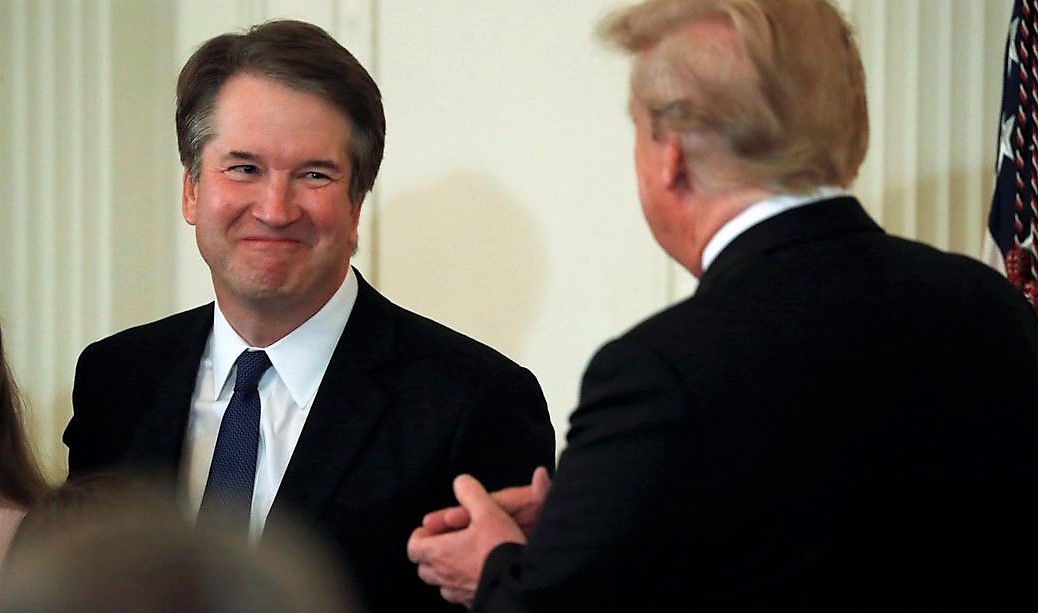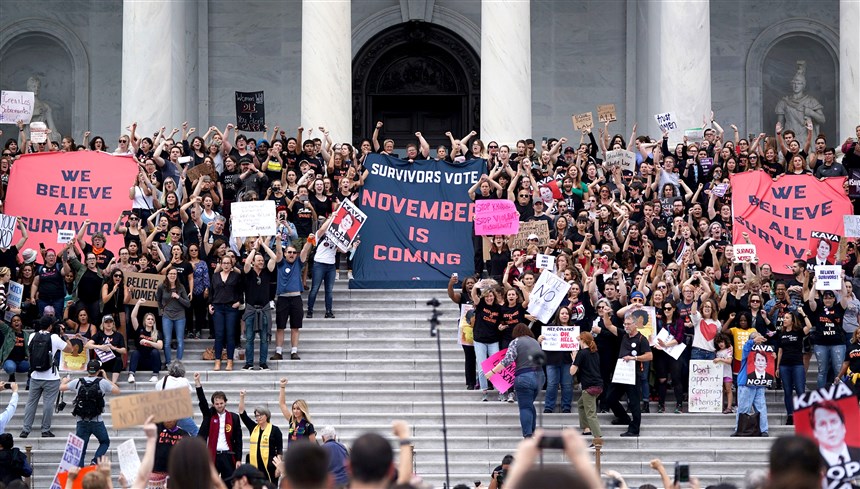Brett Kavanaugh has been confirmed as the 114th justice on the United States Supreme Court.
It is a victory for President Trump, who nominated him, and the bare Republican majority in the senate who confirmed him.
The vote was 50 to confirm and 48 opposed, with Sen. Steve Daines (R-MT) absent for his daughter’s wedding and Sen. Lisa Murkowski voting “present.”
Kavanaugh, with a conservative judicial record and Catholic background, is the 108th white male to take his place on the court.
Just before the vote, hundreds of protesters crossed police lines to gather on the steps of the Senate, chanting, “November is coming.”
Some held large red signs with black letters, stretched across several steps that read, “We believe all survivors.” Two women kneeled in front of the steps, fists raised in the air, before hundreds more protesters who gathered in front of the steps.
Within half an hour, police began climbing the steps and detaining protesters. As they were brought off the steps, officers zip-tied protesters’ hands behind their backs before leading them away from the building.
Kavaugh replaces Anthony Kennedy, widely regarded as a conservative-moderate jurist who was a pivotal 5th vote in cases involving abortion and gay rights.
Disputes involving abortion, immigration, gay rights, voting rights and transgender troops all could be waiting for Kavanaugh and the other justices soon.
Several legal battles are currently being fought over state laws restricting abortion, including one in Arkansas that effectively bans medication-induced abortions. The justices in May opted not to intervene in a case challenging that law, waiting instead for lower courts to rule, but it could return to them when that happens.
Other abortion-related cases in progress include challenges to laws banning abortions at early stages of pregnancies, including Iowa’s prohibition after a fetal heartbeat is detected. There is litigation arising from plans by some states to stop reimbursements under the Medicaid insurance program to Planned Parenthood because of the national healthcare provider’s abortion rights stance.
There also are challenges to state laws imposing difficult-to-meet regulations on abortion providers, such as requiring formal ties with a local hospital.
Liberals are concerned that he could provide a decisive fifth vote on the nine-justice court to overturn the 1973 abortion ruling, Roe v. Wade.
Another issue expected to return to the court is whether certain types of businesses can refuse service to gay couples because of religious objections to same-sex marriage.
The high court in June sided, on narrow legal grounds, with a Colorado baker who refused to make a wedding cake for two men because of his Christian beliefs, but justices sidestepped the larger question of whether to allow broad religious-based exemptions to anti-discrimination laws.
The issue of refusing services to gay people could be back before the justices this term, in a case involving a Washington state Christian florist who similarly refused to serve a gay couple.
Trump’s bid to restrict the military service of transgender people has been challenged in lower courts and is another issue that could make its way to the Supreme Court.
Kavanaugh could also have to deal with cases involving a practice called partisan gerrymandering in which state legislators redraw electoral maps to try to cement their own party in power. In June, the justices avoided a broad ruling on whether the practice violates the constitutional rights of voters and whether federal judges can intervene to rectify it.
And then there is the possibility Trump will find himself in a legal battle with special counsel Robert Mueller over the Russian investigation.
Kavanaugh did not commit to recuse himself from that issue if it were to appear before the Supreme Court.

